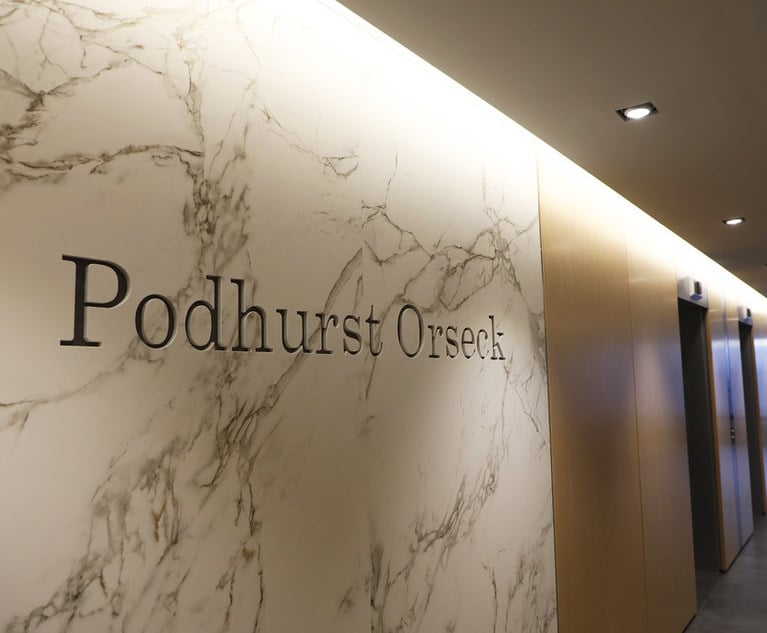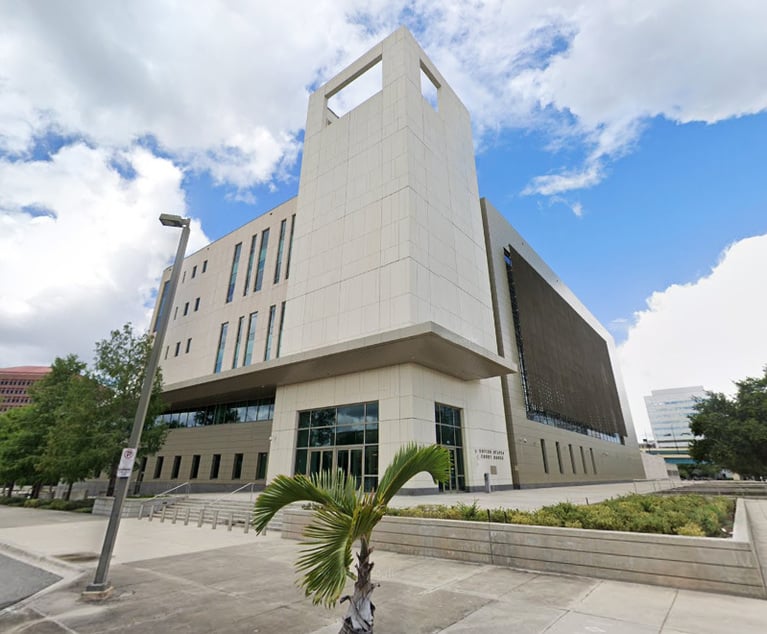Court Rules for Coral Gables Lawyer Who Used Narrow Exemption to Seek Fees After Client's Misconduct
The dispute over attorney fees stemmed from an Engle Tobacco case.
July 08, 2020 at 03:20 PM
3 minute read

Florida's Third District Court of Appeal ruled on a narrow exception for fees claimed by a withdrawing attorney.
It found a client's conduct which justified withdrawal could permit a contingency fee attorney to recover fees in quantum meruit, or a reasonable sum of money for services when the amount due is not stipulated in a legally enforceable contract.
The dispute over attorney fees stemmed from an Engle Tobacco case in which Carl Palomino, an attorney of the Law Office of Carl Palomino in Coral Gables, represented Raul Berea, in a wrongful death action against several tobacco manufacturers and distributors.
Miriam Hernandez, the acting personal representative of Berea's estate, hired Palomino through a contingency fee contract. Palomino worked on the case for several years and then withdrew due to a disagreement with Hernandez. But despite Palomino's withdrawal, he was still able to collect attorney fees in quantum meruit.
Now the Third DCA has affirmed the Miami-Dade Circuit Court ruling that awarded Palomino over $37,000 in attorney fees, a reduction of one-third of the amount Palomino requested, according to a lower court motion.
In the Engle case, a represented class of Florida citizens were awarded $145 billion in punitive damages by a jury verdict. On appeal, an appellate court overturned the jury verdict and the Supreme Court of Florida affirmed that ruling. In addition, the Florida Supreme Court decertified the class, which meant members of the original lawsuit could only file cases individually.
Palamino filed his motion for attorney fees, and described that he and Hernandez had irreconcilable differences in the wrongful death action. Palomino specifically described the disagreements he had with his client, which included whether Hernandez would advance the cost of experts, Hernandez's credibility on two different issues, and the attorney and client's inability to agree on any coherent settlement strategy.
Palomino declined to comment, and Hernandez did not respond to a request for comment.
These irreconcilable differences prompted Palomino to file a charging lien and withdraw, citing "ethical and professional obligations," the Third DCA opinion stated.
|Read the Third DCA opinion:
|When Palomino moved to enforce his charging lien, seeking recovery of earned fees in quantum meruit, the Miami-Dade Circuit Court awarded him a portion of the requested fees.
On appeal, the Third DCA cited DePena v. Cruz in its opinion. Based on that precedent, the appellate court stated an attorney who voluntarily withdraws from representing a client before the occurrence of a contingency would forfeit his right to compensation.
However, Faro v. Romani provides for a narrow exception in those rare cases where "the client's conduct makes the attorney's continued performance of the contract either legally impossible or would cause the attorney to violate an ethical rule of the Rules Regulating The Florida Bar."
The Third DCA stated in its opinion that Hernandez's conduct had sought to undermine the integrity of the prosecution and subvert the judicial process. It found that under those circumstances, "Palomino was entitled to recovery in quantum meruit."
This content has been archived. It is available through our partners, LexisNexis® and Bloomberg Law.
To view this content, please continue to their sites.
Not a Lexis Subscriber?
Subscribe Now
Not a Bloomberg Law Subscriber?
Subscribe Now
NOT FOR REPRINT
© 2024 ALM Global, LLC, All Rights Reserved. Request academic re-use from www.copyright.com. All other uses, submit a request to [email protected]. For more information visit Asset & Logo Licensing.
You Might Like
View All
Muhammad Ali's Daughter Accused of Ignoring South Florida Judge

In Upholding Ruling, Sixth DCA Certifies Question to Florida Supreme Court
4 minute read
Podhurst Orseck, Client and Ex-Partner Face Nearly $575K in Attorney Fees
4 minute read
Judge Recommends $424K in Attorney Fees in BioPlus Data Breach Settlement
3 minute readTrending Stories
- 1Call for Nominations: Elite Trial Lawyers 2025
- 2Senate Judiciary Dems Release Report on Supreme Court Ethics
- 3Senate Confirms Last 2 of Biden's California Judicial Nominees
- 4Morrison & Foerster Doles Out Year-End and Special Bonuses, Raises Base Compensation for Associates
- 5Tom Girardi to Surrender to Federal Authorities on Jan. 7
Who Got The Work
Michael G. Bongiorno, Andrew Scott Dulberg and Elizabeth E. Driscoll from Wilmer Cutler Pickering Hale and Dorr have stepped in to represent Symbotic Inc., an A.I.-enabled technology platform that focuses on increasing supply chain efficiency, and other defendants in a pending shareholder derivative lawsuit. The case, filed Oct. 2 in Massachusetts District Court by the Brown Law Firm on behalf of Stephen Austen, accuses certain officers and directors of misleading investors in regard to Symbotic's potential for margin growth by failing to disclose that the company was not equipped to timely deploy its systems or manage expenses through project delays. The case, assigned to U.S. District Judge Nathaniel M. Gorton, is 1:24-cv-12522, Austen v. Cohen et al.
Who Got The Work
Edmund Polubinski and Marie Killmond of Davis Polk & Wardwell have entered appearances for data platform software development company MongoDB and other defendants in a pending shareholder derivative lawsuit. The action, filed Oct. 7 in New York Southern District Court by the Brown Law Firm, accuses the company's directors and/or officers of falsely expressing confidence in the company’s restructuring of its sales incentive plan and downplaying the severity of decreases in its upfront commitments. The case is 1:24-cv-07594, Roy v. Ittycheria et al.
Who Got The Work
Amy O. Bruchs and Kurt F. Ellison of Michael Best & Friedrich have entered appearances for Epic Systems Corp. in a pending employment discrimination lawsuit. The suit was filed Sept. 7 in Wisconsin Western District Court by Levine Eisberner LLC and Siri & Glimstad on behalf of a project manager who claims that he was wrongfully terminated after applying for a religious exemption to the defendant's COVID-19 vaccine mandate. The case, assigned to U.S. Magistrate Judge Anita Marie Boor, is 3:24-cv-00630, Secker, Nathan v. Epic Systems Corporation.
Who Got The Work
David X. Sullivan, Thomas J. Finn and Gregory A. Hall from McCarter & English have entered appearances for Sunrun Installation Services in a pending civil rights lawsuit. The complaint was filed Sept. 4 in Connecticut District Court by attorney Robert M. Berke on behalf of former employee George Edward Steins, who was arrested and charged with employing an unregistered home improvement salesperson. The complaint alleges that had Sunrun informed the Connecticut Department of Consumer Protection that the plaintiff's employment had ended in 2017 and that he no longer held Sunrun's home improvement contractor license, he would not have been hit with charges, which were dismissed in May 2024. The case, assigned to U.S. District Judge Jeffrey A. Meyer, is 3:24-cv-01423, Steins v. Sunrun, Inc. et al.
Who Got The Work
Greenberg Traurig shareholder Joshua L. Raskin has entered an appearance for boohoo.com UK Ltd. in a pending patent infringement lawsuit. The suit, filed Sept. 3 in Texas Eastern District Court by Rozier Hardt McDonough on behalf of Alto Dynamics, asserts five patents related to an online shopping platform. The case, assigned to U.S. District Judge Rodney Gilstrap, is 2:24-cv-00719, Alto Dynamics, LLC v. boohoo.com UK Limited.
Featured Firms
Law Offices of Gary Martin Hays & Associates, P.C.
(470) 294-1674
Law Offices of Mark E. Salomone
(857) 444-6468
Smith & Hassler
(713) 739-1250






